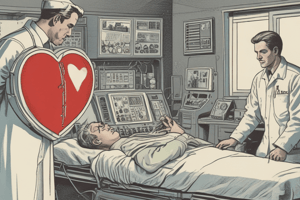Podcast
Questions and Answers
What is one potential cause of chest pain related to ischemic heart disease?
What is one potential cause of chest pain related to ischemic heart disease?
- Tumours
- Angina (correct)
- Rib fracture
- Pleurisy
Palpitations are always caused by anxiety.
Palpitations are always caused by anxiety.
False (B)
Name one respiratory cause of chest pain.
Name one respiratory cause of chest pain.
Pneumothorax
The awareness of heart beats is termed __________.
The awareness of heart beats is termed __________.
Match the condition with its corresponding characteristic:
Match the condition with its corresponding characteristic:
Which of the following is NOT a cause of chest pain?
Which of the following is NOT a cause of chest pain?
A sense of impending death is a symptom of myocardial infarction.
A sense of impending death is a symptom of myocardial infarction.
What physiological sensation is described by 'awareness of heart beats'?
What physiological sensation is described by 'awareness of heart beats'?
One mediastinal cause of chest pain is ____________.
One mediastinal cause of chest pain is ____________.
Which of the following is a characteristic symptom of myocardial infarction?
Which of the following is a characteristic symptom of myocardial infarction?
What is a characteristic of pitting oedema?
What is a characteristic of pitting oedema?
Lower limb oedema can be caused by obstruction of lymphatic circulation.
Lower limb oedema can be caused by obstruction of lymphatic circulation.
What are two potential causes of swelling in both lower limbs?
What are two potential causes of swelling in both lower limbs?
Lower limb oedema can be described as an output of liquid plasma from blood vessels into the __________ tissue.
Lower limb oedema can be described as an output of liquid plasma from blood vessels into the __________ tissue.
Match the following cardiac sounds with their descriptions:
Match the following cardiac sounds with their descriptions:
What symptom may accompany lower limb oedema?
What symptom may accompany lower limb oedema?
Oedema can only affect both legs evenly.
Oedema can only affect both legs evenly.
What physical manifestation can indicate RV enlargement?
What physical manifestation can indicate RV enlargement?
An obstruction in venous circulation can lead to __________ in one leg.
An obstruction in venous circulation can lead to __________ in one leg.
Which of the following is not a possible cause of lower limb oedema?
Which of the following is not a possible cause of lower limb oedema?
Flashcards
Lower Limb Edema
Lower Limb Edema
A condition where fluid from blood vessels leaks into the tissues of the legs, causing swelling.
Pitting Edema
Pitting Edema
Swelling that is soft and leaves an indentation when pressed, often occurring in lower limbs.
Bilateral Lower Limb Edema
Bilateral Lower Limb Edema
Edema affecting both legs equally, possibly due to conditions affecting the whole body.
Unilateral Lower Limb Edema
Unilateral Lower Limb Edema
Signup and view all the flashcards
Chest Vein Examination
Chest Vein Examination
Signup and view all the flashcards
Pericardial Bulge
Pericardial Bulge
Signup and view all the flashcards
Pectus Excavatum
Pectus Excavatum
Signup and view all the flashcards
Pectus Carinatum
Pectus Carinatum
Signup and view all the flashcards
Cardiac Murmurs
Cardiac Murmurs
Signup and view all the flashcards
Cardiac Sound Site
Cardiac Sound Site
Signup and view all the flashcards
Palpitations
Palpitations
Signup and view all the flashcards
Fainting (Syncope)
Fainting (Syncope)
Signup and view all the flashcards
Dizziness
Dizziness
Signup and view all the flashcards
Arrhythmia
Arrhythmia
Signup and view all the flashcards
Angina
Angina
Signup and view all the flashcards
Myocardial Infarction (MI - Heart Attack)
Myocardial Infarction (MI - Heart Attack)
Signup and view all the flashcards
Tachycardia
Tachycardia
Signup and view all the flashcards
Bradycardia
Bradycardia
Signup and view all the flashcards
Fibrillation
Fibrillation
Signup and view all the flashcards
Syncope
Syncope
Signup and view all the flashcards
Study Notes
Cardiovascular Disorders: Symptoms & Signs
- Cardiac Diseases: Symptoms categorized as pulmonary congestive symptoms, low cardiac output syndrome (LCOS), chest pain, palpitations, systemic venous congestive symptoms, embolic manifestations, constitutional symptoms, cyanosis, and symptoms related to peripheral vascular diseases.
Dyspnea (Shortness of Breath)
- Types: Exertional, positional, paroxysmal, and acute dyspnea.
- Causes (Cardiac): Heart failure (HF), valvular heart disease (VHD), congenital heart disease (CHD).
- Causes (Other): Anaemia, obesity, thyrotoxicosis, myasthenia gravis, physiological factors like exercise, pregnancy, sedentary lifestyle, and high altitude.
Cough
- Causes (Dry): Central causes (brain abscess, tumors, hemorrhage, encephalitis, meningitis), and reflex causes (laryngeal, pharyngeal, tracheal, bronchial, alveolar, pleural, ear).
- Causes (Productive): Mucoid (chronic bronchitis), watery/frothy/blood-tinged (left-sided heart failure), mucopurulent (acute inflammatory), pyogenic (lung abscess, bronchiectasis) or red currant jelly (bronchogenic carcinoma).
Haemoptysis (Coughing up Blood)
- Causes: Chest issues (except bronchial asthma), cardiac issues (mitral stenosis, left-sided heart failure), and general causes (bleeding tendency, drugs).
Low Cardiac Output Syndrome (LCOS) Symptoms
- Symptoms related to low cardiac output, including syncope, dizziness, easy fatigability, anginal pain, and intermittent claudication.
Systemic Congestive Symptoms
- Symptoms related to right-sided heart failure, including lower limb edema (LL), ascites, right hypochondrial pain, jaundice, and dyspepsia.
Oedema of Lower Limbs (LL)
- Definition: Abnormal swelling of LL due to fluid accumulation in subcutaneous tissue.
- Classification: Bilateral (CHF, renal failure, hepatic failure, prolonged standing, pregnancy, medications, repeated tapping etc) or Unilateral (DVT, cellulitis, trauma).
- Pitting: All cases showing oedema when compressed.
- Non-pitting: Lymphedema and myxedema, don't show pitting.
Ascites
- Fluid accumulation in the peritoneal cavity, may occur before lower limb oedema
Embolic Manifestations
- Transient episodes of arterial blockage from the heart or diseased vessels, manifesting as sudden hemiplegia, blindness, acute chest pain, abdominal pain (mesenteric occlusion), limb pain, or pain less hematuria..
Cyanosis
- Bluish discolouration of skin, lips, fingers, and toes due to reduced haemoglobin levels.
Constitutional Symptoms
- Generalized, non-specific symptoms like fever, chills, body aches, and malaise, often accompanying various cardiovascular conditions.
Chest Pain
- Causes associated with cardiovascular diseases, respiratory issues, mediastinal conditions, and chest wall issues..
Palpitations
- Awareness of heartbeats, with potential causes related to abnormal heart rhythm (arrhythmias.)
Neck Veins
- Normal neck veins are not prominent or visible but may be prominent and congested in some cardiac illnesses.
Clubbing
- Proliferation of connective tissue in the nail bed, associated with diverse medical conditions, including chronic hypoxia, cyanotic heart disease, COPD, and lung fibrosis.
Cardiac Local Examination
- Methods for physical examination like inspection, percussion, palpation, and auscultation providing crucial insights into cardiovascular function.
Studying That Suits You
Use AI to generate personalized quizzes and flashcards to suit your learning preferences.





